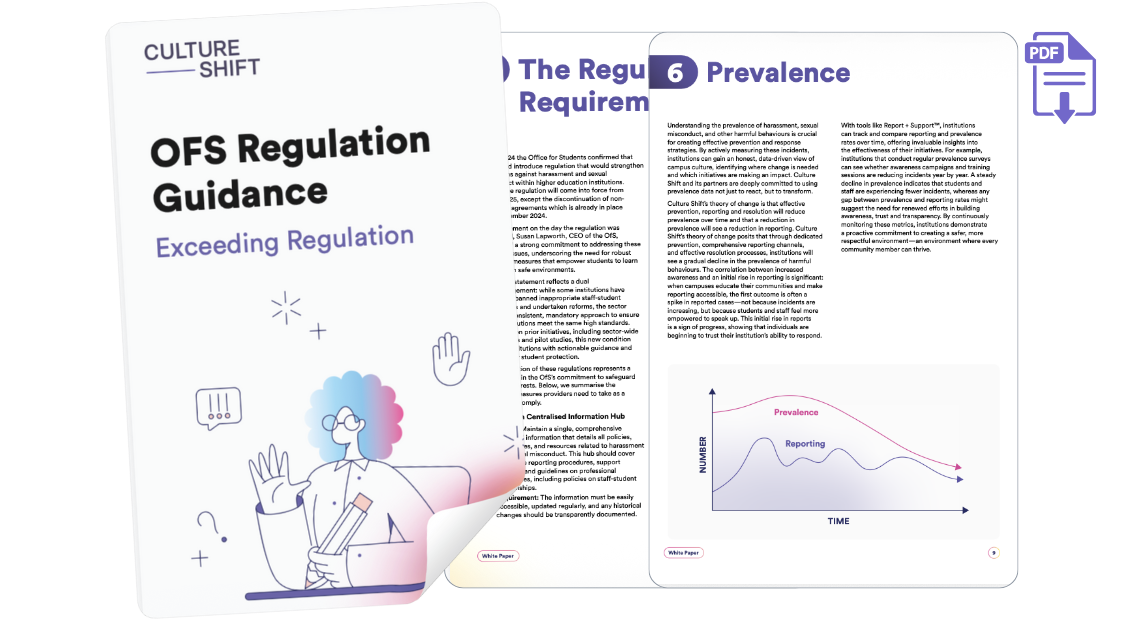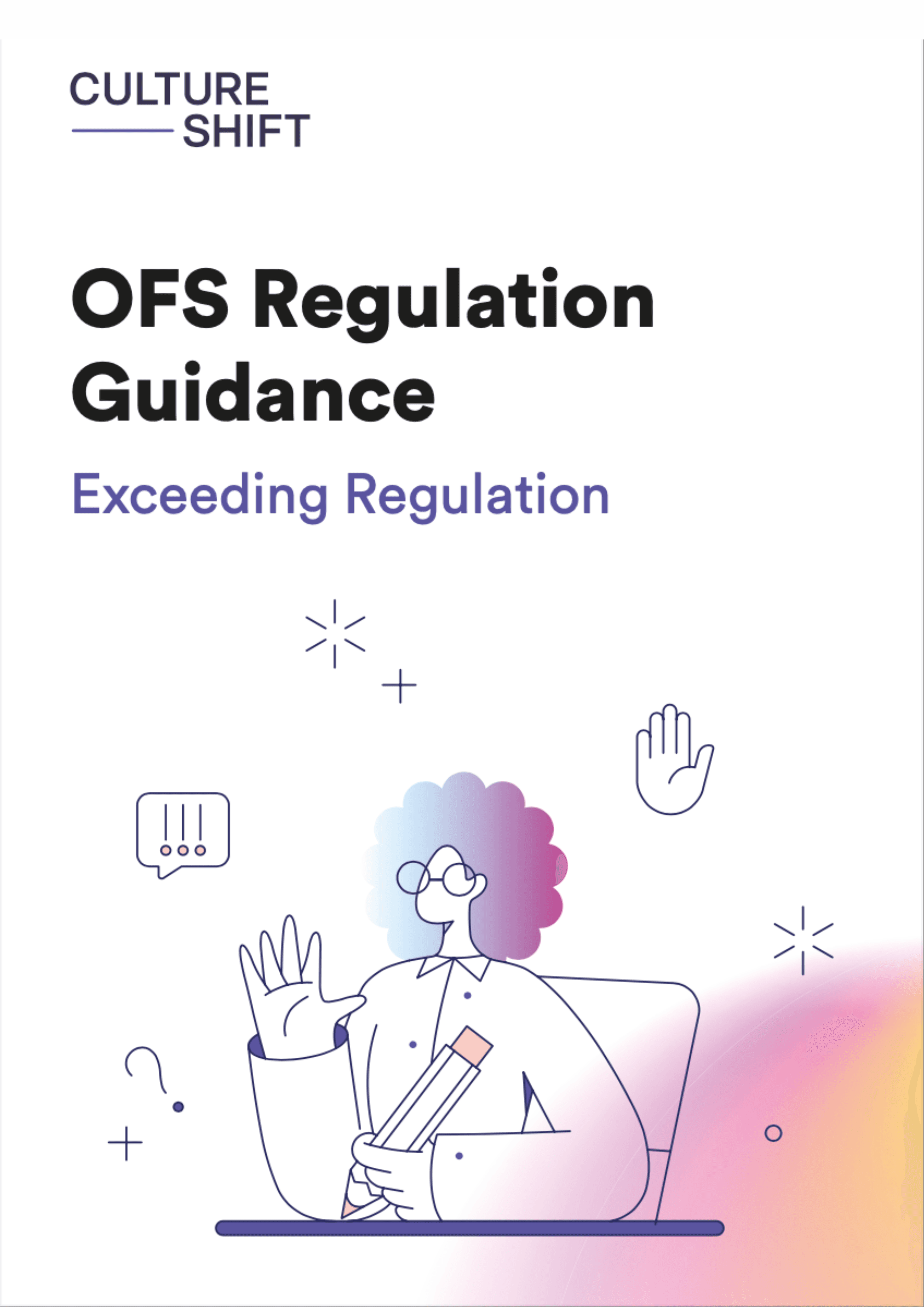How to comply with the OfS E6 Condition of Registration
The Office for Students E6 Regulation came into force in August 2025. E6 regulates how Higher Education Institutions (HEIs) prevent and respond to harassment and sexual misconduct affecting students, as well as personal relationships between staff and students to manage any incidents relating to an abuse of power.
HEIs are required to take significant and credible steps to protect students from behaviour that amounts to harassment and/or sexual misconduct. It requires an institution wide, proactive approach and is ultimately designed to raise standards across the sector to reduce the prevalence of harassment and sexual misconduct in the education sector.
Additional resources
E6 Regulation Compliance Checklist
In order to comply with the E6 Regulations, HEIs must meet several key requirements:
Prepare your comprehensive single source of information
Under the new regulations HEIs are required to compile a single source of information in relation to harassment and sexual misconduct. It should outline how students can report incidents, what constitutes unacceptable behaviour and the support available to them. As a minimum this single source of information should include content on institutional policies, case handling and support. This single source of information needs to be prominent for students, easily accessible and can take the form of a web page that links to other sources of relevant information.
- Prepared single source of information webpage
- Send information once a year to staff and students as a minimum requirement
- Follow the ‘prominence principles’ to encourage regular communications and ongoing campaigns throughout the year to reinforce reporting and support available
Put in place clear policies on staff-student relationships
To manage the risks of personal relationships between students and staff, HEIs must put in place clear policies and procedures that minimise the risks of an abuse of power. The OfS suggests that banning staff-student relationships could be considered as a step to make a ‘credible difference’ in protecting students.
- Prepare your staff-student relationship policy and procedure
- Add to your single source of information
- Communicate policies to staff and students
Review your reporting mechanisms
As part of the minimum content requirements that sets out how students and staff can report unwanted behaviour, HEIs are therefore also required to provide appropriate reporting mechanisms to comply with the regulations. To comply with the regulations HEIs should:
- Provide a range of different mechanisms to allow reports, including in person and online
- Support anonymous reporting and align this with freedom of speech principles.
- Remove actual or perceived barriers to reporting to encourage reporting
- Handle information collected sensitively and with appropriate confidentiality
Assess capacity and adequately resource your team
The regulation requires HEIs to ‘have the capacity and resources necessary to facilitate compliance’. In practical terms this means assessing the capacity of your team and adequately allocating staff and financial resources to manage reporting systems, investigations and support services. We know that universities are going through a funding crisis, however, continued investment into the safety and well-being of students is paramount. A reduction in funding for addressing harassment and sexual misconduct will directly impact compliance with the E6 regulation.
- Explore innovative ways to increase capacity and ensure resources are adequate for both prevention and response
Schedule mandatory student and staff training
Training is a large part of complying with the new E6 regulation and the OfS strongly indicates that training should be mandatory, not optional for both staff and students. Students are expected to be ‘appropriately informed to ensure understanding’ of policies that relate to harassment and sexual misconduct and the types of behaviour that may constitute harassment and sexual misconduct.
- Scale communication around harassment and sexual misconduct
- Train appropriate staff to deliver mandatory training
- Ensure mandatory training for staff and students is scheduled
- Bystander training
Reassess your provision of student support
HEIs should provide support to students who report harassment and sexual misconduct, regardless of whether you consider the report to meet your definitions of harassment or sexual misconduct. For example, this could include instances where a formal complaint is not made or there is insufficient evidence to progress to disciplinary proceedings or whether the instance occurred on or off your university campus.
- Ensure internal staff are aware of the support on offer and how to signpost students to it
- Consider if you deliver your own support services or outsource to an appropriate provider
- Different types of support available for students who have experienced sexual misconduct for example counselling or a referral to a Sexual Assault Referral Centre
- Providing relevant academic support
Appropriate record keeping
To demonstrate compliance with the regulations, HEIs should keep appropriate records, in particular, the steps taken to protect students. When addressing harassment and sexual harassment HEIs should also document their decision-making process per case to demonstrate ‘significant and credible steps’ have been taken to protect students in different contexts.
Re-familiarise yourself and uphold freedom of speech principles
Freedom of speech and academic freedom are fundamental to higher education to encourage the pursuit of knowledge, challenging principles and exchanging ideas. However, there is a fine line between freedom of speech and behaviour that directly causes harm to students, for example hate speech and racism.
Review definitions and processes in line with latest freedom of speech principles to balance freedom of speech with the right to live free from harassment and sexual misconduct
- Review complaints, disciplinary and grievance procedures to balance competing rights
- Put in place clear reporting processes for deciding when behaviour falls under freedom of speech or directly cause harm to students
Cease all use of NDAs in relation to harassment & sexual misconduct cases
The ban on NDAs in cases involving harassment, sexual misconduct and bullying came into force on 1 September 2024. Universities should therefore no longer be using NDAs in relation to this type of behaviour under the Freedom of Speech Act 2023. It aims to ensure universities are held accountable for addressing misconduct, increasing transparency and strengthening freedom of speech principles.
- Audit existing NDAs to ensure compliance with new regulations
- Ensure policies and confidentiality arrangement comply with the new regulations
Complete guide to Exceeding Regulations: OfS E6 Condition of Registration
Practical ways Culture Shift can support you to meet the new OfS Regulation
Culture Shift has been working closely with the higher education sector since 2016 when we first launched Report + Support™ with the University of Manchester. Since then, we have been trusted by HE providers across the UK to support them in providing a safe and secure anonymous reporting platform, data insights and training. With Report + Support™ we can help you not only meet but exceed the new OfS regulations.
All-in-one accessible reporting platform
Our all in one Report+Support™ anonymous reporting platform is a user tested full suite reporting software and resolution system that streamlines reporting, improves case management, empowering HEIs to tackle harassment, sexual misconduct and other culture damaging behaviour.
Confidential two-way-messaging
Our two-way-messaging is a powerful new feature designed to transform how you engage with reporters. Communicate directly with reporters, whether they choose to remain anonymous or provide their identity, this feature allows you to gather more information and provide continued support and advice helping you fulfil your safeguarding duties.
Powerful data analysis and prevalence reports
Our platform provides powerful analytics tools and a dashboard that details the types of incidents that are being reported, how long you are taking to respond to them. Our report building function builds reports for internal and external sharing to close the feedback loop.
Training
Our training courses can help you meet the regulatory requirements by having all staff responding to disclosures/reports appropriately trained.
Campaigns
Culture Shift’s ready-made campaigns are a valuable resource containing printable and digital assets, templates and guidance that HEIs can roll out straight away. They cover being an active bystander, allyship, encouraging people to speak up when they experience unacceptable behaviour and preventing sexual harassment.



